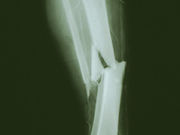Fracture risk site specific, changing from pattern linked to obesity to pattern linked to osteoporosis
FRIDAY, July 29, 2016 (HealthDay News) — Patients undergoing bariatric surgery have increased risk of fracture, according to a study published online July 28 in the BMJ.
Catherine Rousseau, from the CHU de Québec Research Center in Québec City, and colleagues conducted a retrospective nested case-control study involving patients who underwent bariatric surgery from 2001 to 2014. Data were included for 12,676 patients who underwent bariatric surgery and 38,028 and 126,760 age- and sex-matched obese and non-obese controls, respectively.
The researchers found that patients undergoing bariatric surgery were more likely to fracture than obese or non-obese controls (10.5 versus 8.1 or 6.6 percent, respectively) before surgery. Bariatric patients were more susceptible to fracture than obese or non-obese controls at a mean of 4.4 years after surgery (4.1 versus 2.7 and 2.4 percent). The bariatric group had a higher postoperative adjusted fracture risk compared with obese and non-obese groups (relative risks, 1.38 and 1.44, respectively). Before surgery, the bariatric group had higher risk of distal lower limb fracture and upper limb fracture; risks of clinical spine, hip, femur, or pelvic fractures were similar for bariatric and obese groups versus non-obese. The risk of distal lower limb fracture was lower, while upper limb, clinical spine, pelvic, hip, or femur fractures increased after surgery.
“Patients undergoing bariatric surgery were more likely to have fractures than were obese or non-obese controls, and this risk remained higher after surgery,” the authors write. “Fracture risk assessment and management should be part of bariatric care.”
Copyright © 2016 HealthDay. All rights reserved.








